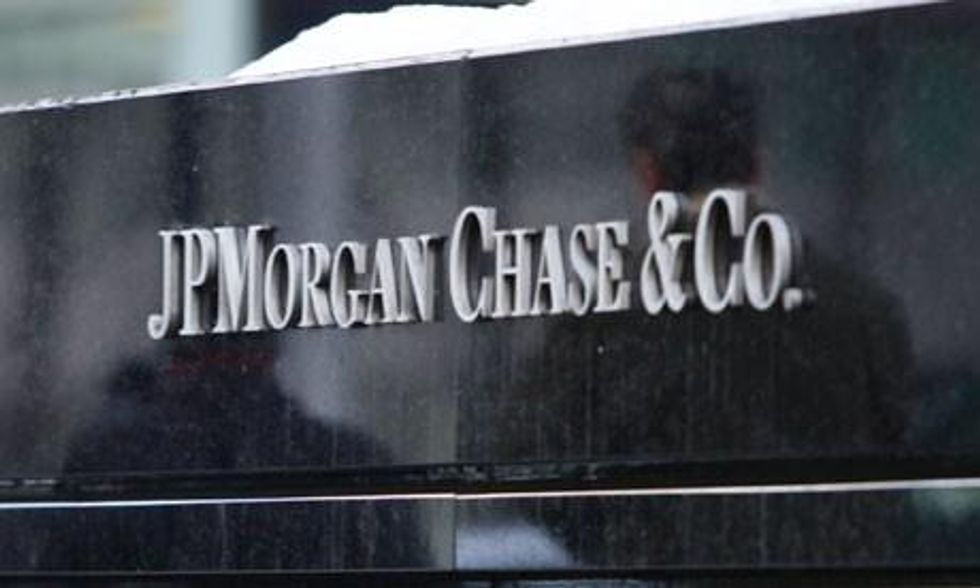

SUBSCRIBE TO OUR FREE NEWSLETTER
Daily news & progressive opinion—funded by the people, not the corporations—delivered straight to your inbox.
5
#000000
#FFFFFF
To donate by check, phone, or other method, see our More Ways to Give page.


Daily news & progressive opinion—funded by the people, not the corporations—delivered straight to your inbox.

According to Evan Perez writing for CNN, at a recent meeting in Washington, federal prosecutors asked the Office of the Comptroller of the Currency--the chief body responsible for regulating JPMorgan and other big banks--what would happen if criminal charges were filed against JPMorgan.
The prosecutors were told by regulators that U.S. law requires that they pull the licenses of banks convicted of criminal charges. As a result, the prosecutors reportedly felt pressured not to press criminal charges, for fear of doing damage to the economy.
"Prosecutors complain that when they push for tougher penalties, regulators warn of consequences that could mean damage to the U.S. economy," Perez writes.
Perez's claims appear to be confirmed by the statements of U.S. Attorney Preet Bharara, following JPMorgan's settlement Tuesday for its complicity in Bernard Madoff's Ponzi scheme. When asked by reporters why the the bank and its leaders did not face stiffer consequences, Bharara replied,
You have to consider consequences such as employees being laid off, the bank failing... You have to consider consequences such as innocent shareholders losing substantial value. You have to consider the possibility that regulators will take action against the charter of the financial institution.
According to Perez, "The result is that highly profitable banks pay large settlements and move on."
_____________________
Dear Common Dreams reader, The U.S. is on a fast track to authoritarianism like nothing I've ever seen. Meanwhile, corporate news outlets are utterly capitulating to Trump, twisting their coverage to avoid drawing his ire while lining up to stuff cash in his pockets. That's why I believe that Common Dreams is doing the best and most consequential reporting that we've ever done. Our small but mighty team is a progressive reporting powerhouse, covering the news every day that the corporate media never will. Our mission has always been simple: To inform. To inspire. And to ignite change for the common good. Now here's the key piece that I want all our readers to understand: None of this would be possible without your financial support. That's not just some fundraising cliche. It's the absolute and literal truth. We don't accept corporate advertising and never will. We don't have a paywall because we don't think people should be blocked from critical news based on their ability to pay. Everything we do is funded by the donations of readers like you. Will you donate now to help power the nonprofit, independent reporting of Common Dreams? Thank you for being a vital member of our community. Together, we can keep independent journalism alive when it’s needed most. - Craig Brown, Co-founder |

According to Evan Perez writing for CNN, at a recent meeting in Washington, federal prosecutors asked the Office of the Comptroller of the Currency--the chief body responsible for regulating JPMorgan and other big banks--what would happen if criminal charges were filed against JPMorgan.
The prosecutors were told by regulators that U.S. law requires that they pull the licenses of banks convicted of criminal charges. As a result, the prosecutors reportedly felt pressured not to press criminal charges, for fear of doing damage to the economy.
"Prosecutors complain that when they push for tougher penalties, regulators warn of consequences that could mean damage to the U.S. economy," Perez writes.
Perez's claims appear to be confirmed by the statements of U.S. Attorney Preet Bharara, following JPMorgan's settlement Tuesday for its complicity in Bernard Madoff's Ponzi scheme. When asked by reporters why the the bank and its leaders did not face stiffer consequences, Bharara replied,
You have to consider consequences such as employees being laid off, the bank failing... You have to consider consequences such as innocent shareholders losing substantial value. You have to consider the possibility that regulators will take action against the charter of the financial institution.
According to Perez, "The result is that highly profitable banks pay large settlements and move on."
_____________________

According to Evan Perez writing for CNN, at a recent meeting in Washington, federal prosecutors asked the Office of the Comptroller of the Currency--the chief body responsible for regulating JPMorgan and other big banks--what would happen if criminal charges were filed against JPMorgan.
The prosecutors were told by regulators that U.S. law requires that they pull the licenses of banks convicted of criminal charges. As a result, the prosecutors reportedly felt pressured not to press criminal charges, for fear of doing damage to the economy.
"Prosecutors complain that when they push for tougher penalties, regulators warn of consequences that could mean damage to the U.S. economy," Perez writes.
Perez's claims appear to be confirmed by the statements of U.S. Attorney Preet Bharara, following JPMorgan's settlement Tuesday for its complicity in Bernard Madoff's Ponzi scheme. When asked by reporters why the the bank and its leaders did not face stiffer consequences, Bharara replied,
You have to consider consequences such as employees being laid off, the bank failing... You have to consider consequences such as innocent shareholders losing substantial value. You have to consider the possibility that regulators will take action against the charter of the financial institution.
According to Perez, "The result is that highly profitable banks pay large settlements and move on."
_____________________